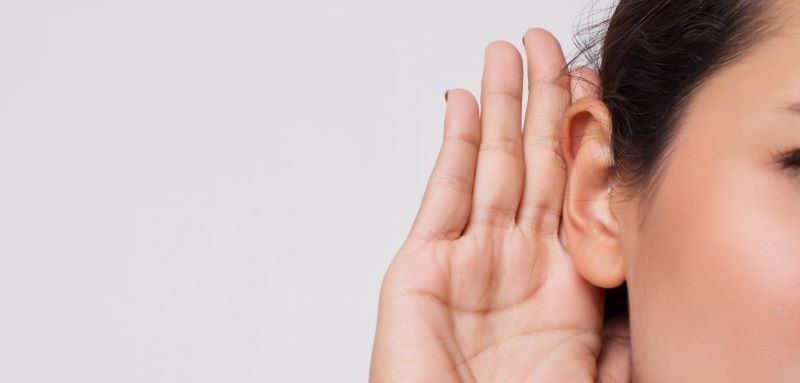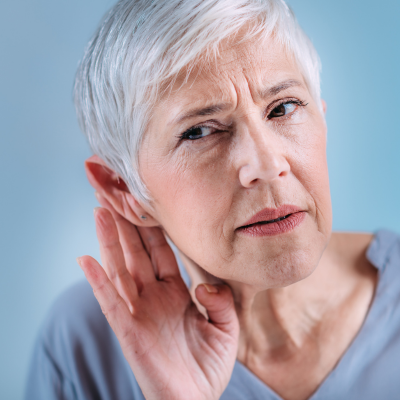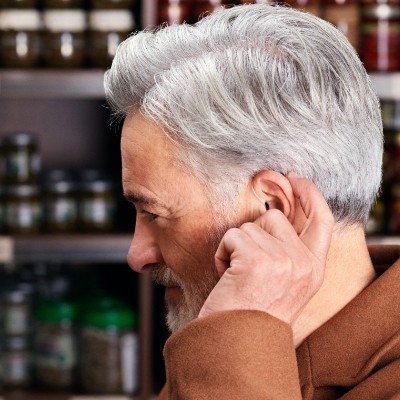
Audiology Expert at Hearing Aid UK

Audiology Expert at Hearing Aid UK

Could the FX 322 drug cure hearing loss?
The science, the trials and the reality
Overview of FX 322 | How does FX 322 work? | What are stem cells? | The science behind FX 322 | The FX 322 trials | Is a cure possible for hearing loss?
March 2023: This article was originally published in June, 2022. It has recently been updated with new information and a complimentary video, both found at the bottom of the article.
Other 2025 updates include: Frequency Therapeutics has shut down, FX-322 and FX-345 will not continue development, and has no new trials, acquisitions, or investor interest.
A new drug, the FX 322, is said to reverse hearing loss
Research is currently being undertaken by Frequency Therapeutics*, a new gel-based drug that is injected into your ear and designed to promote stem cell growth. This will regenerate and develop hair-like stereocilia cells, which are said to reverse hearing loss.
A procedure that is hoped to be performed in ENT clinics in the future. Let's take a look at the science, trials, and reality behind this new drug for hearing loss. Is this really a cure for hearing loss?
How does it work?
The drug, named FX-322, is an injection that is said to work by stimulating the dormant stem cells inside your ear to grow new healthy auditory cells that send sounds to your brain for you to process and understand. It is said to be delivered into the middle ear and absorbed by the inner ear.
What are stem cells?
Throughout your body, you have stem cells that are incomplete and usually have the ability to develop into any form of tissue. This particular drug encourages them to grow into stereocilia, which are hair-like cells in your ears that detect sound. Hearing loss occurs when these hair cells are irreversibly damaged, as they cannot repair themselves.
Today, hearing aids are the most successful form of treatment for amplifying sound. These early studies hope to restore sensorineural hearing loss (SNHL). Sensorineural hearing loss is the most common type of loss caused by ageing, genetics and prolonged exposure to loud sounds.
However, it is one thing to grow hair cells; getting them to work is another thing entirely.
Simplifying the science
The FX 322 gel contains drugs that early studies indicate help aid new hair cell formation. These are called progenitor cells, which are unable to evolve into any body tissue. Instead, they are usually more inclined to develop into cells near where they are found in the body.
So the progenitor cells in the ear will more than likely turn into tiny hearing cells. In short, this drug is designed to assist in helping molecules activate these cells to regrow the lost sensory cells. These cells are needed to filter and tune sounds.
FX 322 drug testing and trials
The research is still in its infancy with a lot of 'ifs', 'buts', and various hoops to jump through before this drug will be signed off for larger-scale human trials.
There have been only small trials (around five clinical studies) so far, with researchers stating that this new drug may help hearing, such as the clarification of sound, speech perception, and understanding, with hair cell regeneration.
With each study undertaken, the scientists behind this research add to their overall understanding of the FX 322 drug, with some speech perception improvements, which was published in Otology & Neurotology.
However, from our understanding of the studies that followed, the drug showed no signs of improvement when compared to the placebo, rendering the evidence inconclusive.

The FX 322 Drug
The reality of the trials
No hearing loss cure yet
There are talks of an evolved version of the FX 322 drug, called FX 345, and that these clinical studies may roll out towards the end of this year. How valid these rumours are is hard to say, as trials have been disappointing so far and investors are actively trying to sue them for false claims about the clinical trials.
Currently, there is no drug or treatment to repair the sensory system, and in reality, the full restoration of hearing is not just debatable, but unlikely.
FX 322 is a novel and experimental drug that is still in the developmental phase; therefore, this does not mean that if you think your hearing has worsened, hearing aids are still the most successful treatment for the foreseeable future.
What is clear is that the more we research the causes and treatments of hearing loss, the more we understand it. However disappointing, trials are still a very important part of audiology research. Such research ultimately influences the evolution of hearing aid technology in the future. Making them better, more efficient, more personable, more powerful.
Latest update for FX 322 clinical drug trials
This clinical trial has temporarily been halted due to poor results with no plans to reintroduce the program. The news has come as no shock, as there have been whispers of lacklustre developments from the start. However, trials such as these are an important part of hearing loss research.
"This was a rigorous and well-designed study that provided us a clear outcome, though not the outcome we wanted. Given these disappointing results, we will cease further development of the company's drug candidates for hearing loss."
Statement by Dr. Chris Loose, Frequency Therapeutics' Chief Scientific Officer**
*FX 322 drug developed by Frequency Therapeutics and the Massachusetts Institute of Technology in the U.S
**Quote source UPI.com
Why Choose Us?
- FREE Hearing Tests
- Best Hearing Aids and Prices
- FREE Aftercare for Life
- FREE Home Visits
- 200+ Local Audiologists
- 60 Day Money Back Guarantee
Think your hearing has changed or worsened?
This article highlights the importance of seeking an early diagnosis of hearing loss. Do not delay treatment, as hearing aids offer many health benefits as well as supporting better communication.
If you think your hearing has worsened, book a free hearing healthcare consultation with one of our audiologists to check how well you're hearing today.
Call us free on 0800 567 7621 to speak with one of our audiologists.
Other hearing loss awareness articles you might like...
 What is Hidden Hearing Loss?
What is Hidden Hearing Loss?  How do I know if I need hearing aids?
How do I know if I need hearing aids?  What is Profound Hearing Loss?
What is Profound Hearing Loss? What's included in our hearing aid prices?
Our specialist service includes:
Do not spend hundreds of pounds without getting a second opinion from us.
Please call us on 0800 567 7621
 Not only are the prices great, but the service is fantastic! Many thanks to your team.
Not only are the prices great, but the service is fantastic! Many thanks to your team.Other pages you might find useful
Common FAQs when researching hearing aids and hearing loss
If you are looking at this page then it is likely that an audiologist has suggested that you purchase this particular hearing aid, so is this the best model for you?
In general, any audiologist will always recommend to you the model that best suits your needs. Here is a useful checklist to make sure that is the case.
- Audiologist level of knowledge: The audiologist you have seen will hopefully have a wide knowledge of all available hearing aids, however, some will only be familiar with a small number of brands and therefore may not really be in a position to know which model is the best for you. It is OK to challenge their recommendation and ask them to justify why this particular brand is the one for you.
- Do research: Read about the hearing aid that was recommended. Does it seem like it will suit your lifestyle? Does it have more or fewer features than you need?
- Be aware of sales targets: Many high street retailers have specific tie-ins to a particular manufacturer/brand. The hearing aid they have suggested may still be the correct one for you, but do your research so that you know why they might have recommended it.
If in doubt, feel free to give us a call. That's what we're here for. In the meantime, read all about our review of the best hearing aids for 2025 here
If you have significant hearing loss in both ears, you should be wearing two hearing aids. Here are the audiological reasons why:
Localisation: The brain decodes information from both ears and compares and contrasts them. By analysing the minuscule time delays as well as the difference in the loudness of each sound reaching the ears, the person is able to accurately locate a sound source. Simply put, if you have better hearing on one side than the other, you can't accurately tell what direction sounds are coming from.
Less amplification is required: A phenomenon known as “binaural summation” means that the hearing aids can be set at a lower and more natural volume setting than if you wore only one hearing aid.
Head shadow effect: High frequencies, the part of your hearing that gives clarity and meaning to speech sounds, cannot bend around your head. Only low frequencies can. Therefore if someone is talking on your unaided side you are likely to hear that they are speaking, but be unable to tell what they have said.
Noise reduction: The brain has its own built-in noise reduction which is only really effective when it is receiving information from both ears. If only one ear is aided, even with the best hearing aid in the world, it will be difficult for you to hear in background noise as your brain is trying to retain all of the sounds (including background noise) rather than filtering it out.
Sound quality: We are designed to hear in stereo. Only hearing from one side sounds a lot less natural to us.
Fancy some further reading on this topic? You can read about why two hearing aids are better than one in our article, hearing aids for both ears, here
For most people, the main benefit of a rechargeable hearing aid is simple convenience. We are used to plugging in our phones and other devices overnight for them to charge up. Here are some other pros and cons:
For anybody with poor dexterity or issues with their fingers, having a rechargeable aid makes a huge difference as normal hearing aid batteries are quite small and some people find them fiddly to change.
One downside is that if you forget to charge your hearing aid, then it is a problem that can't be instantly fixed. For most a 30-minute charge will get you at least two or three hours of hearing, but if you are the type of person who is likely to forget to plug them in regularly then you're probably better off with standard batteries.
Rechargeable aids are also a little bit bigger and are only available in Behind the Ear models.
Finally, just like with a mobile phone, the amount of charge you get on day one is not going to be the same as you get a few years down the line. Be sure to ask what the policy is with the manufacturer warranty when it comes to replacing the battery.
Looking for more information on rechargeable hearing aids? Read our dedicated page on the topic here
For most people, the answer is yes. But it's never that simple.
The majority of hearing problems affect the high frequencies a lot more than the low ones. Therefore open fitting hearing aids sound a lot more natural and ones that block your ears up can make your own voice sound like you are talking with your head in a bucket. Therefore in-ear aids tend to be less natural.
However the true answer is we can't tell until we have had a look in your ears to assess the size of your ear canal, and until we have tested your hearing to see which frequencies are being affected.
People with wider ear canals tend to have more flexibility, also there are open fitting modular CIC hearing aids now that do not block your ears.
There is also the age old rule to consider, that a hearing aid will not help you if it's sat in the drawer gathering dust. If the only hearing aid you would be happy wearing is one that people can't see, then that's what you should get.
Most people can adapt to any type of hearing aid, as long as they know what to expect. Have an honest conversation with your audiologist as to what your needs are.
Generally speaking, six or more. Unless it's none at all.
The number of channels a hearing aid has is often a simplistic way an audiologist will use to explain why one hearing aid is better than another, but channels are complex and it is really not that straightforward. Here are some reasons why:
Hearing aids amplify sounds of different frequencies by different amounts. Most people have lost more high frequencies than low and therefore need more amplification in the high frequencies. The range of sounds you hear are split into frequency bands or channels and the hearing aids are set to provide the right amount of hearing at each frequency level.
Less than six channels and this cannot be done with much accuracy, so six is the magic number. However, a six channel aid is typically very basic with few other features and is suitable only for hearing a single speaker in a quiet room. The number of channels is not what you should be looking at, it's more the rest of the technology that comes with them.
As a final note, different manufacturers have different approaches. One method is not necessarily better than any other. For example, some manufacturers have as many as 64 channels in their top aids. Most tend to have between 17 and 20. One manufacturer has no channels at all.
Hearing aids are easily lost, misplaced or damaged and typically are one of the most expensive personal possessions an individual can own. We offer hearing aid warranty coverage for £80 per year per aid. Find out more about this service we provide here
All our audiologists use the very latest technology and provide the full range of tests to accurately measure your hearing for free. Find out about what hearing healthcare services we offer all our customers here
Hearing Aid UK offers all their customers free home visiting services, even in a care home environment, for no extra cost. Including hearing tests, fittings, maintenance, check-ups and much more in the comfort of your own home and at your convenience. Find out more information about our home visits here
Here, at Hearing Aid UK, we are dedicated to offering low hearing aid prices. We achieve this by having no head office and low marketing costs. Our hearing aid prices are amongst the lowest you will find anywhere in the world. Explore our prices, brands, and models here
Ask the Experts
6 Morton Lane
Walkwood
Redditch
Worcestershire
B97 5QA
Latest Launch
When we refer to a product as 'Latest Launch', we mean it is the latest to be released on the market.
New
When we refer to a product as 'New', we mean that the product is the newest hearing aid model on the market.
When we refer to a product as 'Superseded', we mean that there is a newer range available which replaces and improves on this product.
Older Model
When we refer to a product as an 'Older Model', we mean that it is has been superseded by at least two more recent hearing aid ranges.
